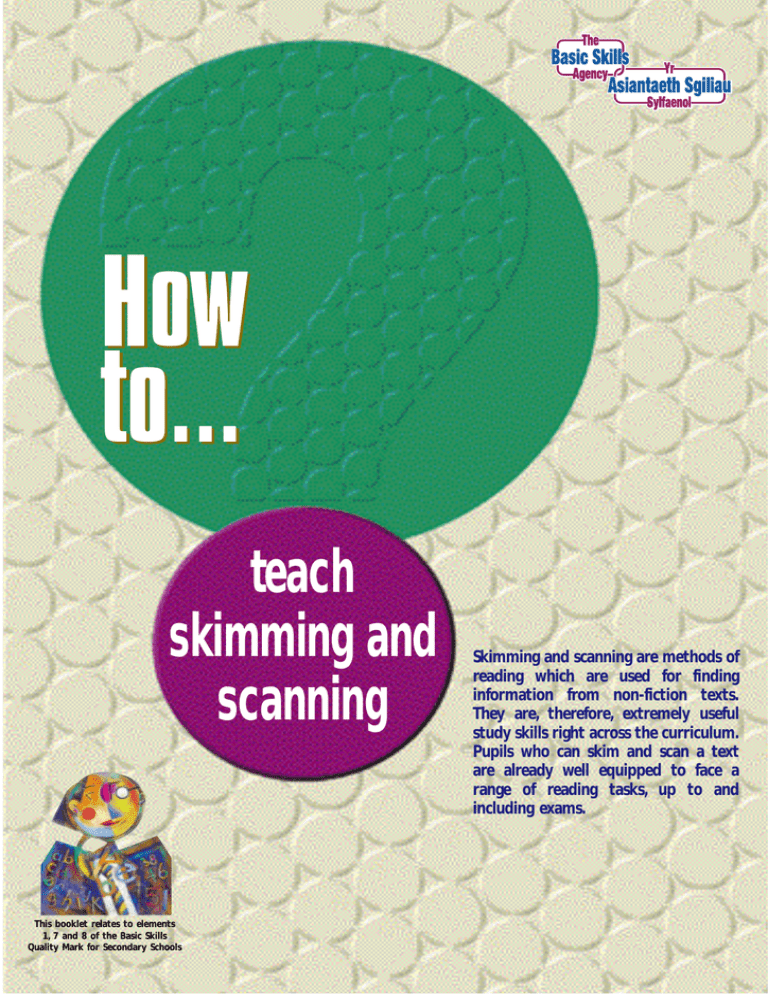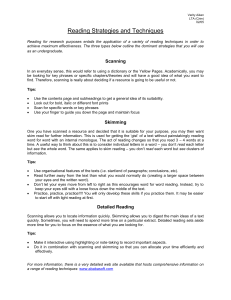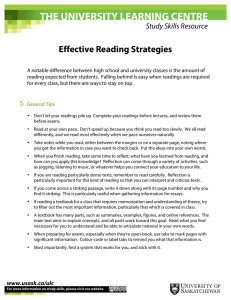How to... teach skimming and
advertisement

How to... teach skimming and scanning This booklet relates to elements 1, 7 and 8 of the Basic Skills Quality Mark for Secondary Schools Skimming and scanning are methods of reading which are used for finding information from non-fiction texts. They are, therefore, extremely useful study skills right across the curriculum. Pupils who can skim and scan a text are already well equipped to face a range of reading tasks, up to and including exams. Setting up Each individual school should decide how best to deliver skimming and scanning techniques to pupils.This could be: • as part of a study skills programme delivered through Personal and Social Education; • • through a library skills programme; • as part of an induction programme to secondary education taught through the core subjects in Year 7; in the run up to all internal and external examinations, e.g. SATs, GCSEs. The teaching of skimming and scanning skills should be a central part of a whole school policy on language across the curriculum. Who should be involved • The process should initially be taught to all pupils as part of their induction into secondary education. • Each curriculum team should explicitly teach and display an agreed list of keywords for their subject that are used as the ‘trigger’ words for skimming and scanning work. • Encourage every teacher to build skimming and scanning exercises into their schemes of work, so that pupils receive regular practice across the curriculum. Identification of pupils All pupils should be taught skimming and scanning skills whatever their ability. Able pupils can improve their independent research skills by being able to access information quickly and accurately. Average ability can improve their ability to identify keywords and to pupils absorb the general tone or feel of a piece of writing, main theme or ideas of a piece of writing. This helps them to identify the central theme, argument or idea. Less able pupils who do not read fluently are often already quite practised at skimming and scanning – in search of words they can already read! Teachers can build upon this ability by showing them how to use this strategy to look for specific words or information. Getting the gist! Skimming is a method of rapid reading to absorb the overall theme, tone or general meaning of a text. It is often used as a precursor to a more detailed search for specific information and is therefore mostly used for non-fiction texts. Skimming means allowing the eye to move rapidly across each line of text, ignoring punctuation and small words, such as ‘in’,‘the’ etc., but allowing the eye to linger over, and take in the larger words and phrases which are related to the theme of the text. teach skimming skills Good skimmers: • • • speak keywords and phrases aloud as they encounter them in the text; develop a feel for the tone or atmosphere of a piece of writing; recognise keywords when they are repeated in the text. 1. Which of the crimes would no longer be considered offences today? 2. Which of the crimes are still offences but are now very rare? TWENTY-ONE days’ hard labour has been imposed on a boy, at Westminster, for playing pitch-and-toss on Gazette, October 4, 1884 Sunday. Highway Robbers T HE following executions have taken place for highway robbery: Richard Randall and John Tubbs, on March 27, 1818; G. Wingfield, March 27, 1829; and William Stephenson, March 22, 1833. Lincolnshire in the News, Feb 22, 1999 1855 S IX young boys were brought before Grantham magistrates on February 1 charged with snowballing. The boys were severely reprimanded and threatened with a month on the treadmill should they be caught snowballing again. Strategies Give pupils a simple but respectable(!) page of a tabloid newspaper. The page should contain a variety of different articles. Ask pupils to find a specific topic contained on the page. Point out that they can check headlines, sub-headings and photos in order to help this process. This could be followed up by giving them an unfamiliar book, and without reading it, get pupils to find facts by: • checking the contents page for specific chapters which should contain the information they are looking for; • • reading the blurb on the inside flap/or the back cover summaries; checking if a summary is given at the beginning or end of each chapter. Most of us have and use skimming skills without realising it. However, it does need to be pointed out to students. Eye to idea… The purpose of scanning is to be able to locate a specific detail such as a key idea, word, date, name, or time in a piece of text. Like skimming, it involves rapid movement of the eye across the page whilst skipping most of the text but keeping the specific detail which is required at the conscious level. Good scanners: teach scanning skills • repeat the required word or phrase verbally or non verbally to themselves whilst they are searching the text; • look for key information or indications, e.g. – capital letters to indicate names, etc. – look for numbers if they are searching for a date – check sub-headings for clues; • recognise keywords in the task and look for where they are repeated in the text or title; • colour match symbols, e.g. map reading where roads are red, rivers are blue, railways are black. Strategies Pupils only become good scanners if they are given regular or frequent practice. A good ten minute exercise for the start or end of a lesson might be to give the pupils a text of approximately 250 words containing a mixture of statistics, facts and opinions based on a given theme (it could be the theme of the lesson). Allow them no more than two minutes reading time for pupils to highlight or underline in colour: • all the statistics (e.g. dates); • • all the keywords related to your chosen theme, e.g.Victorian London; the answer to one specific question, e.g. what is photosynthesis? In an age when we are bombarded by information at an ever-increasing rate, the pupil who can quickly locate what is essential knowledge is already ahead of the field! The Basic Skills Agency Commonwealth House, 1–19 New Oxford Street, London WC1A 1NU Tel: 020 7405 4017 • Fax: 020 7440 7770 e-mail: walesenquiries@basic-skills.co.uk www.basic-skills-wales.org Janet Winfield Advanced Skills Teacher, Literacy Coordinator, Frome Community College Sue Spencer Manager of Learning Support, Frome Community College






